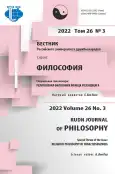The Ban on Idolatry and the Concept of Difference in Franz Rosenzweig’s Philosophy
- Authors: Pigalev A.I.1
-
Affiliations:
- Volgograd State University
- Issue: Vol 26, No 3 (2022): RELIGIOUS PHILOSOPHY OF FRANZ ROSENZWEIG
- Pages: 509-522
- Section: RELIGIOUS PHILOSOPHY OF FRANZ ROSENZWEIG
- URL: https://journal-vniispk.ru/2313-2302/article/view/325305
- DOI: https://doi.org/10.22363/2313-2302-2022-26-3-509-522
- ID: 325305
Cite item
Full Text
Abstract
The purpose of the research is to analyze the context, the essence, and the philosophical implications of Franz Rosenzweig's reconsideration of the ban on idolatry as an implication of pure monotheism. As often as not idolatry is defined generally as the adoration of some images that, representing deity, are considered to be autonomous and hereupon become the objects of worship. The study confines itself to the analysis of the significance of the ban on idolatry in Rosenzweig's interpretation of the concept of difference that underlies his theoretical model of the Other. The consideration proceeds on the general assumption that the encounter of tradition with modernity is the factor that determines the radical change in the philosophies of societies under modernization. In this context, the ancient ban on idolatry means the rejection and prohibition of whatever representation as intricate mediation that is, in turn, the hallmark of modernity. However, according to Rosenzweig, idolatry is not the usage of images as the representations of the reputedly unrepresentable God, but the fixation on one image which would mean the arbitrary limitation of God's infinite freedom to reveal himself visually. This implies that the reconsidered ban on idolatry does not require the absolute prohibition of representation, but the latter should be construed as temporal. Such an approach prevents the identification of the representation of entity with this entity itself, the sign with the thing, and therefore prohibits self-referentiality. Rosenzweig's stance determines also his understanding of familiarity, unfamiliarity, and difference in art and translation. Rosenzweig's emphasis on the shocking influence of the defamiliarizing difference as the feature of the work of art correlates with his interpretation of the translation that should make stable shared senses unfamiliar. Thus, the reconsidered ban on idolatry underlies Rosenzweig's conception of the reconciliation between Jewish tradition and modernity.
Keywords
About the authors
Alexander I. Pigalev
Volgograd State University
Author for correspondence.
Email: pigalev@volsu.ru
ORCID iD: 0000-0003-4858-8862
Doctor of philosophy, Professor, Leading Researcher
100, Universitetskiy prospekt, Volgograd, 400062, Russian FederationReferences
- Rosenzweig F. Das neue Denken. Einige nachträgliche Bemerkungen zum “Stern der Erlösung”. In: Der Mensch und sein Werk. Gesammelte Schriften. Bd. 3. Zweistromland: Kleinere Schriften zu Glauben und Denken. Hrsg. von R. Mayer und A. Mayer. Dordrecht, et al.: Martinus Nijhoff; 1984. s. 139-161.
- Halbertal M., Margalit A. Idolatry. Goldblum N (tr.). Cambridge (MA), London: Harvard University Press; 1992.
- Strauss LB, Brenner M, editors. Mediating Modernity: Challenges and Trends in the Jewish Encounter with the Modern World: Essays in Honor of Michael A. Meyer. Detroit (MI): Wayne Stae University Press; 2008.
- Meyer MA, Myers DN, editors. Between Jewish Tradition and Modernity: Rethinking an Old Opposition: Essays in Honor of David Ellenson. Detroit (MI): Wayne State University Press; 2014.
- Löwy M, Sayre R. Romanticism Against the Tide of Modernity. Porter C (tr.). Durham; London: Duke University Press; 2001.
- Rubinstein E. An Episode of Jewish Romanticism: Franz Rosenzweig’s The Star of Redemption. Albany (NY): SUNY Press; 1999.
- Benjamin MH. Rosenzweig’s Bible: Reinventing Scripture for Jewish Modernity. Cambridge (UK), et. al.: Cambridge University Press; 2009.
- Akush A. Moses Mendelssohn and the Enlightenment. Albany (NY): SUNY Press; 1994.
- Freudenthal G. No Religion without Idolatry: Mendelssohn’s Jewish Enlightenment. Notre Dame (IN): University of Notre Dame Press; 2012.
- Rosenzweig F. Zur Encyclopaedia Judaica. Zum zweiten Band. Mit einer Anmerkung über Antropomorphismus. In: Der Mensch und sein Werk. Gesammelte Schriften. Bd. 3. Zweistromland: Kleinere Schriften zu Glauben und Denken. Hrsg. von R. Mayer und A. Mayer. Dordrecht, et al.: Martinus Nijhoff; 1984. s. 735-741.
- Batnitzky L. Idolatry and Representation: The Philosophy of Franz Rosenzweig Reconsidered. Princeton (NJ): Princeton University Press; 2000.
- Rosenzweig F. The Star of Redemption. Galli BE (tr.). Madison (WI): The University of Wisconsin Press; 2005.
- Heidegger M. The Origin of the Work of Art. In: Off the Beaten Track. Young J and Haynes K, editors and tr. Cambridge (UK): Cambridge University Press; 2002. p. 1-56.
- Rosenzweig F. Die Schrift und Luther. In: Der Mensch und sein Werk. Gesammelte Schriften. Bd. 3. Zweistromland: Kleinere Schriften zu Glauben und Denken. Hrsg. von R. Mayer und A. Mayer. Dordrecht, et al.: Martinus Nijhoff; 1984. s. 749-772.
- Rosenzweig F. Neues Lernen. In: Der Mensch und sein Werk. Gesammelte Schriften. Bd. 3. Zweistromland: Kleinere Schriften zu Glauben und Denken. Hrsg. von R. Mayer und A. Mayer. Dordrecht et al.: Martinus Nijhoff; 1984. s. 505-510.
Supplementary files









